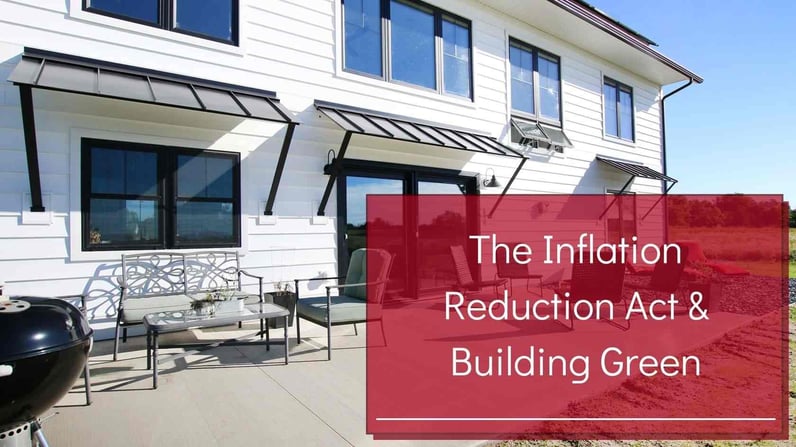3 Min Read
The Inflation Reduction Act & Building Green
Green homes often come with a prohibitive price tag, or at least that’s a perception that keeps many homeowners from considering purchasing green homes or pursuing eco-friendly home improvements. The Inflation Reduction Act is not the only government program that incentivizes working with a green building contractor. Still, it is the newest and most substantial package to address green residential construction directly. Don’t miss out on serious savings and the opportunity to build the eco-friendly home you’ve always dreamed about. R-Value Homes is pleased to deconstruct the aspects of the Inflation Reduction Act that change the game for affordable green options for your residential construction project.

R-Value Homes construct clean, durable, eco-friendly Insulated Concrete Form (ICF) homes in Grand Rapids and west Michigan. As a member of the thriving community of expert green builders in our area, our expert insights on the implications of the new Inflation Reduction Act can provide the knowledge you need to plan your green residential construction project in 2023 and beyond.
What Does the Inflation Reduction Act Do?
The Inflation Reduction Act includes several main components. It is over 700 pages long. For our purposes, we will focus on those aspects related to custom home construction.
Why Does the Inflation Reduction Act Address Building Green?
The Inflation Reduction Act incentivizes green building while addressing inflation by investing in goods related to renewable energy. Concentrating on clean energy boosts American manufacturing supply chains. This sector provides future job security due to its steady growth and the continued demand for renewable energy-related goods projected well into the future.
Inflation affects the environment in the short term by reducing spending and keeping cars off the road and production low. Inflation in the long-term incentivizes shortcuts and increased pollution as manufacturers and consumers choose the cheapest available option. The Inflation Reduction Act could reduce American carbon emissions by as much as 40% with its investment in renewable energy.
Energy Tax Credits for 2022 and Beyond
Experts have highlighted the benefit of reducing the cost of green technology so a broader market can afford to consider building green. The Inflation Reduction Act has gone beyond renewing existing tax credits set to expire in 2023 and has created new tax credits to further incentivize upgrading with energy-efficient products or building green for the first time. If your green upgrades are a few years later, you can count on the tax incentives outlined here to be available for the next decade or more. If you’ve made energy-efficient home improvements in 2022 and any of your projects meet the standards in the act, these credits are also retroactive for all of 2022.
Rebates for Green Energy Goods
Let’s talk about real value. Here are the maximum amounts available for some of the green home upgrades included in the Inflation Reduction Act’s Nonbusiness Energy Property Credit.
- Breaker box upgrade-$4,000.
- Energy star electric stove, cooktop, range, or oven; or an electric heat pump clothes dryer-$840.
- Electric wiring-$2,500.
- Heat pump water heater-$1,750.
- Heat pump for space heating or cooling-$8,000.
- Insulation, air sealing, and ventilation-$1,600.
How Does the Inflation Reduction Act Make Solar Panels More Affordable?
A second rebate program reimburses between $2,000 and $8,000 for projects that take on several eco-friendly upgrades at once or for pricier projects. This tax credit can be claimed at each yearly filing. You can deduct thirty percent of the cost of installing new solar panels from your federal taxes under the Inflation Reduction Act’s Energy Efficient Home Improvement Credit. For example, you can reduce your federal tax burden by $7,000 when you spend $21,000 installing photovoltaic (PV) technology.
Do Michigan Tax Incentives Stack with Federal Rebates?
Michigan has been an inconsistent place for state-sponsored solar programs. There is currently no rebate in the state of Michigan for installing a PV system, though many manufacturers offer rebates that can be combined with federal offerings. The property tax exemption for homes with solar panels has returned to Michigan as of 2019, which means that installing solar panels does not increase your home’s taxable value.
A great resource for current rebates, credits, and incentives is https://www.dsireusa.org/
ICF is Your Best Option for an Energy-Efficient Custom Home in West Michigan
We would love to talk to you about ways we can incorporate these savings and incentives while building your green dream home in the Grand Rapids area. Reach out today to begin the conversation that ends in your ICF custom home.





